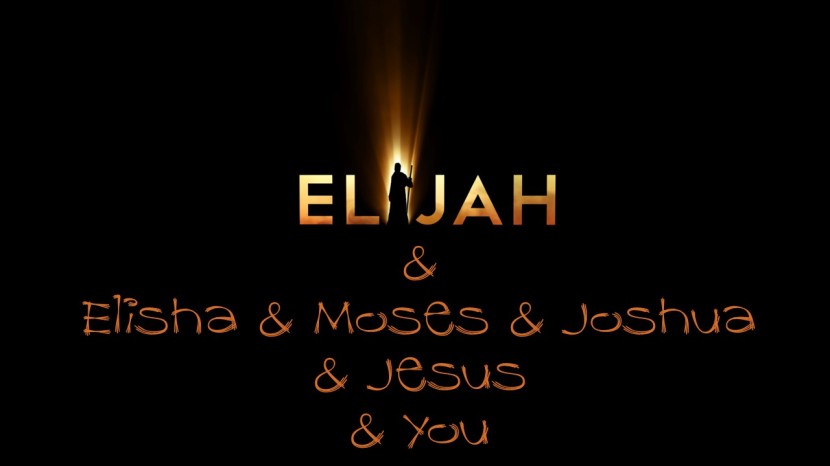Elijah & Elisha
The account of Elijah’s final days found in 2 Kings 1 -2 tells a story with echoes to other characters and themes of Scripture. This blog post will differ from my usual style as I explore some of these “echoes”.

ELIJAH = John the Baptizer
Malachi 4:5 predicts that “[God] will send the prophet Elijah to you before that great and dreadful day of the Lord comes“.
Jesus himself in Matthew 11:14 says of John, “If you are willing to accept it, he is the Elijah who was to come.”
Like John, Elijah spent a lot of time as a lone voice in the wilderness. Even the description of Elijah sounds a lot like John:
- He had a garment of hair and had a leather belt around his waist.” The king said, “That was Elijah the Tishbite.” (2 Kings 1:8)
- John’s clothes were made of camel’s hair, and he had a leather belt around his waist. His food was locusts and wild honey. (Matt 3:4)
Elijah’s primary ministry was challenging the ungodliness of King Ahab and his wife Jezebel. John ultimately died for challenging the ungodliness of King Herod and his wife.
ELISHA = Jesus
Unlike Elijah, Elisha spends a lot of time mentoring a large group referred to as “the sons of the prophets”.
Miracles were a mainstay of Elisha’s ministry. In 2 Kings 4, Elisha multiplies food and brings a dead boy back to life. In chapter 5 he heals Naaman of leprosy and in chapter 6 causes an axehead to float on water. Even in death Elisha’s grave gave new life to dead man. (2 Kings 13:20-21)
While John had some disciples, Jesus had his famous group of 12 disciples and his less well know group of 70. He didn’t locate his ministry in the wilderness. He went to the people.
Jesus’ ministry was also characterised by miracles. In Matthew 14 after the death of John the Baptizer Jesus multiplies food to feed 5,000, then walks on water. In chapter 9 he raises a dead girl back to life, heals blind and mute men, and casts out demons. Jesus’ empty tomb promises life top all humanity.
ELIJAH = Jesus & ELISHA = Disciples
- Elijah calls Elisha to leave his oxen and come follow him. (1 Kings 1:19-21) Jesus calls his disciples to leave their fishing nets and come follow him (Matt 4:18-22).
- Elisha requests “a double portion of your spirit” from Elijah. (2 Kings 2:9) Jesus promised his disciples the presence of the Holy Spirit after his death. (Matt 14:15-19)
- Elijah was taken up to the heavens while Elisha watched. (2 Kings 2:11) Jesus was also “taken up before their very eyes, and a cloud hid him from their sight. (Acts 1:9)
- The sons of the prophets could recognise that “The spirit of Elijah is resting on Elisha.” (2 Kings 2:15) Likewise, when Peter and John were hauled before the court, the religious leaders “saw their courage… and they took note that these men had been with Jesus.” (Acts 4:13)
- Receiving Elijah’s spirit meant that Elisha would continue his ministry. The church as the body of Christ continues the ministry of Christ even to this day.
ELIJAH = Moses
Elijah’s consistent opposition to King Ahab mirrors Moses’ confrontation with Pharaoh. When Pharoah was defeated and his son died, Moses left Egypt passing through the Red Sea on dry land.
2 Kings 1 opens with the death of Ahab and his son Ahaziah. With Ahaziah dead Elijah leaves the land crossing the Jordan River on dry land. This was a triumphal kind of “exodus moment” for Elijah.
Both Moses and Elijah’s lives end on the eastern bank of the Jordan River leaving their replacements to complete the mission.
ELISHA = Joshua
Joshua entered Canaan to claim it for God by crossing the Jordan River on dry ground. Elisha also commences his ministry to reclaim the soul of Israel for Yahweh by crossing the Jordan River on dry ground. (2 Kings 2:14)
Joshua’s first stop in Canaan was to destroy and curse Jericho so it could never be rebuilt. (Joshua 6:26) Elisha also headed straight to Jericho only this time God used him to heal the land and provide pure water to the city. (2 Kings 2:19-21)
Joshua’s next conflict was with the city Ai. A close reading shows that the battle took place between the cities of Ai and Bethel. Bethel’s men fought with Ai to resist Joshua. (Joshua 8:9-17) Elisha’s next stop was also Bethel where young men opposed him and challenged his role as God’s prophet. God was again victorious. (2 Kings 23-24)
In light of all these comparisons, the presence of Moses and Elijah with Jesus at his transfiguration make more sense. Not only are Moses and Elijah great men of God, but their lives tell similar stories that came to fulfillment in Jesus. (Matthew 17:1-13)
